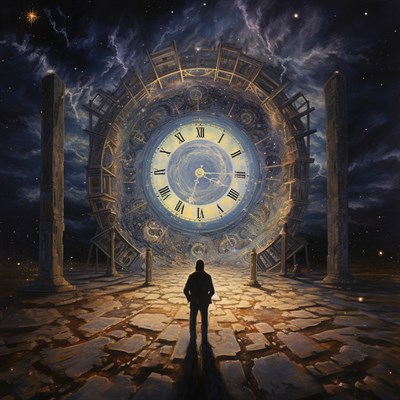Fundamental Versus Emergent Time
Exploring the idea of fundamental versus emergent time
 Philosophers and physicists often debate about whether time is fundamental or emergent. First, lets discuss what Time actually is:
Philosophers and physicists often debate about whether time is fundamental or emergent. First, lets discuss what Time actually is:
Time is a Dimension
Albert Einstein, in his groundbreaking Special Theory of Relativity in 1905, unveiled that time is actually a dimension, and tied to the three dimensions of space (X,Y,Z) that we are intimately familiar with. Time is a geometric entity, interweaved with space as another dimension. We experience time in a different fashion than we do of space, but ultimately, time and the three vectors of space are of a singular topology: dimensions.
ConscioCentrism Posits One More Dimension - A Quick Preview
The idea of understanding the nature of dimensions is a key concept in the ConscioCentric paradigm, as Consciocentrism proposes that there is a further dimension that is tied to the Many Worlds Interpretation (MWI) of quantum mechanics and the Schrodinger Equation / Wave Function. The "many worlds", in the ConscioCentric view, indicates another dimension, in which parallel potential timelines exist on a perpendicular axis to time. This is explored in much more detail in this site. For now, lets return to just discussing the four dimensions (4D) of space-time.
 Sean Carroll
Sean Carroll
Physicist, Philosopher
"Space itself is not fundamental; it’s just a useful way of talking from certain points of view."
Something Deeply Hidden
The Order of the Dimensions, Fundamental Versus Emergent
So, we have established (or rather Einstein has) that time is really a geometric construct / a dimensional construct. We will discuss later why it is experienced differently than space... but for now lets talk about what "fundamental" versus "emergent" means in this common debate about the nature of time. When we say "emergent", we're really describing that time is, in the order of the dimensions, later in its order. If time is emergent, then space constitutes the primary/fundamental 1st, 2nd and 3rd dimension, and then time, the 4th dimension, emerges from those three space fundamental space dimensions, which allows space to change its configuration. Whereas, if we're saying Time is fundamental, we're really saying that Time is the 1st dimension, and foundation, and that space emerges from that as the 2nd, 3rd and 4th dimensions. So, this debate about fundamental versus emergent time is really a debate about the "Order of Dimensions", and if they are stacked, which is the foundation dimension.
 Is the Fundamental Versus Emergent Debate a Moot Point?
Is the Fundamental Versus Emergent Debate a Moot Point?
If we do some thought experiments, just in the realm of the three space dimensions (3D), we may actually come to the conclusion that the whole debate of fundamental versus emergent dimensions may be a moot point. For instance, we could say that the left/right dimension is the fundamental dimension, and forward/backward and up/down emerge from left/right dimension. But how silly does that sound? We could just as easily make the case that forward/backward space dimension is the fundamental one, and left/right and up/down emerge. So, just thinking about this idea of the "order of dimensions" is an interesting thought experiment to evaluate how much importance we should give to the debate. But -- there is definitely something unique about the dimension of time, in that we experience it in a very different way than we do with space... at least in terms of human consciousness. Perhaps there are other levels of consciousness that see the 3rd dimension of space, like we do of time. For instance, a theoretical 2D conscious lifeform (ie: in Edwin Abbott's Flatland), might experience one of our space dimensions as their time. This concept is actually a key concept that is discussed throughout this website. For now, though, lets ignore this possibility and just continue on with the assumption that our 4D experience with time indicates some unique difference in dimensional properties.
 Lee Cronin
Lee Cronin
Chemist, Assembly Theory Pioneer
"My intuition is that the mechanism of consciousness requires time to be fundamental."
Twitter Mar 21, 2023
Time is Fundamental for Human Consciousness
As discussed above, at an abstraction of dimensions, the whole discussion of fundamental versus emergent dimensions may be a moot point, but since we experience time in such a different fashion than space, lets go ahead and make a decision to order the space dimensions versus time. In the Consciocentric view, we would say that time is fundamental. This could be expressed as Time is the 1st dimension, and the three dimensions of space (X,Y,Z) emerge from time. A singularity event (The Big Bang) is where three dimensions of space emerged from time. (Perhaps time emerged from a 0D singularity point in the Big Bang event, but even in that case, we'll say as the dimensions unfolded in the big bang, the order was 1D time, then 2D/3D/4D space dimensions.
Note: As mentioned above, Consciocentrism actually posits that our consciousness exists in 5D, and there is another fundamental dimension which is the canvas for the Many World's interpretation of Quantum Mechanics. We experience reality as going forward through time, but looking down the perpendicular axis of time (the Many Worlds), and seeing a composite image of the many worlds of possibility. That is what we see as "mostly solid" reality, in the moment of now. In the moment of now, the many worlds "collapse/align" extremely closely, though with some uncertainty still... this may be due to a gravity type of effect at the manifold between Time:MWI dimensions (Much more about this throughout the website) For now, lets just return to the proven 4D space-time (or time-space) construct --
The Arrow of Time
The most mysterious aspect of time (and maybe the ONLY ASPECT) of the time dimension that makes time appear as different than space, is the fact that we experience a one-directional arrow to time. We only experience time moving forward, at least for our consensual reality and the moving "moment of now". (Memory, Visualization and Imagination is not bound to this constraint with the time dimension or potential MWI dimension) This aspect of the time dimension, the Arrow of Time, is the one differentiator. If we didn't experience this one directional arrow, the time dimension could be experienced same as space dimensions... ie: If we could freely move forward and backward in time, it would be no different in principle than how we experience our three space dimensions. This thought experiment is particularly useful in understanding what dimensions really are. Dimensions represent an axis/promotion in which all other interweaved dimensions can completely change their configuration.
 The ConscioCentric View - Time is Fundamental
The ConscioCentric View - Time is Fundamental
So, to sum up, I would say that if we're giving importance to the order of dimensions, in terms of how human consciousness experiences them, then yes, Time is Fundamental. Time is more primary than space, as it has a unique feature to it that we experience -- a collective, consensual direction down the dimensional axis. Consciocentrism takes this idea a step further though, and posits that there may actually be two dimensions which are the foundation for our experience of reality/consciousness.
0D Point / Singularity
1D Time Axis
2D MWI Axis (Many Worlds)
3D X-Axis of Space
4D Y-Axis of Space
5D Z-Axis of Space
 David BohmPhysicist, Conscious Researcher, Philosopher
David BohmPhysicist, Conscious Researcher, Philosopher "We have reversed the usual classical notion that the independent "elementary parts" of the world are the fundamental reality, and that the various systems are merely particular contingent forms and arrangements of these parts. Rather, we say that inseparable quantum interconnectedness of the whole universe is the fundamental reality, and that relatively independent behaving parts are merely particular and contingent forms within this whole."
 Max PlanckPhysicist, Father of Quantum Theory, Nobel Prize
Max PlanckPhysicist, Father of Quantum Theory, Nobel Prize "I regard consciousness as fundamental. I regard matter as derivative from consciousness. We cannot get behind consciousness. Everything that we talk about, everything that we regard as existing, postulates consciousness."
 Erwin SchrodingerPhysicist, Quantum Mechanics Pioneer
Erwin SchrodingerPhysicist, Quantum Mechanics Pioneer "Consciousness cannot be accounted for in physical terms. For consciousness is absolutely fundamental. It cannot be accounted for in terms of anything else."
 Allan CombsConsciousness Researcher, Neuroscientist
Allan CombsConsciousness Researcher, Neuroscientist "The universe according to Bohm actually has two faces, or more precisely, two orders. One is the explicate order, corresponding to the physical world as we know it in day-to-day reality, the other a deeper, more fundamental order which Bohm calls the implicate order. The implicate order is the vast holomovement. We see only the surface of this movement as it presents or "explicates" itself from moment to moment in time and space. What we see in the world — the explicate order — is no more than the surface of the implicate order as it unfolds. Time and space are themselves the modes or forms of the unfolding process. They are like the screen on the video game. The displays on the screen may seem to interact directly with each other but, in fact, their interaction merely reflects what the game computer is doing. The rules which govern the operation of the computer are, of course, different from those that govern the behavior of the figures displayed on the screen. Moreover, like the implicate order of Bohm's model, the computer might be capable of many operations that in no way apparent upon examination of the game itself as it progresses on the screen."
 Bernard CarrProfessor, Mathematician, Cosmologist
Bernard CarrProfessor, Mathematician, Cosmologist "Consciousness is not just generated as a result of physical processes... it’s there from the beginning. It's a primary, a fundamental component, rather than a secondary component of the universe."
 Bernard CarrProfessor, Mathematician, Cosmologist
Bernard CarrProfessor, Mathematician, Cosmologist "Knowing that the experience of consciousness is affected by the brain is not the same as saying that the brain actually generates the consciousness... there is a different view which says that actually consciousness is, in some sense, more fundamental and that the brain is merely a mechanism through which the consciousness can observe the universe. "
 Sean CarrollPhysicist, Philosopher
Sean CarrollPhysicist, Philosopher "Space itself is not fundamental; it’s just a useful way of talking from certain points of view."
 Lee CroninChemist, Assembly Theory Pioneer
Lee CroninChemist, Assembly Theory Pioneer "My intuition is that the mechanism of consciousness requires time to be fundamental."